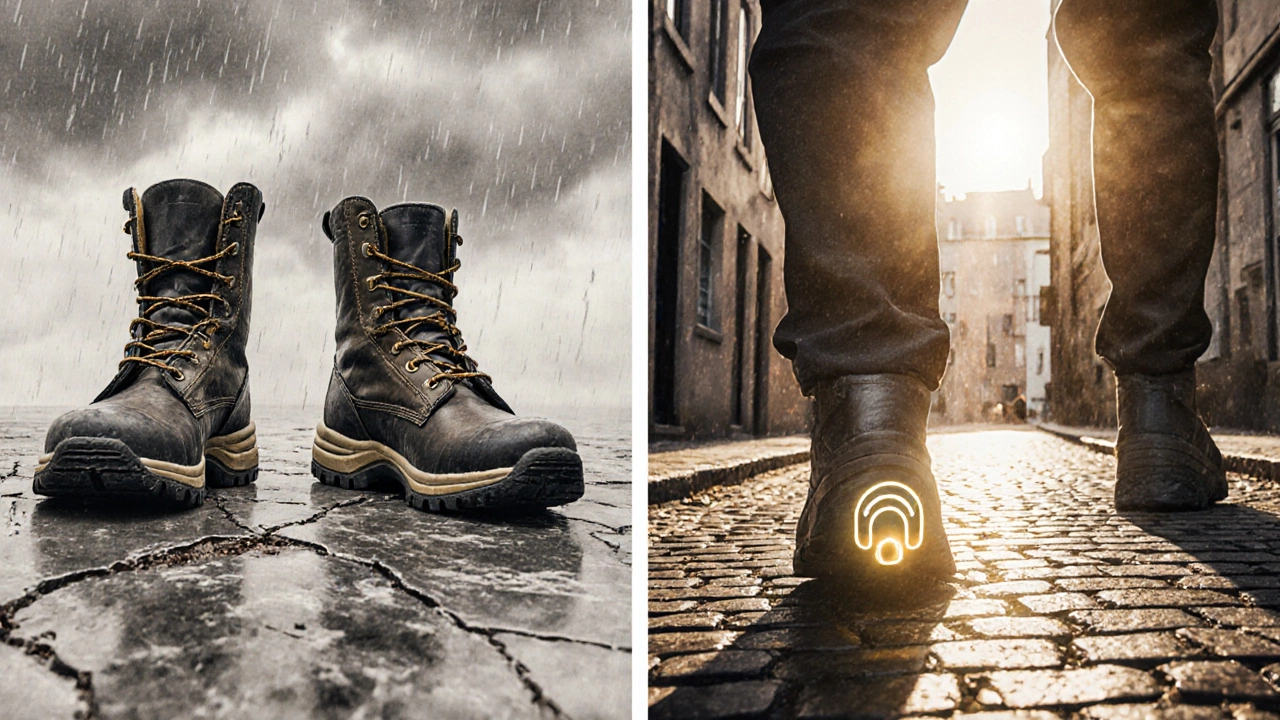Work Shoe Feature Checker for Irish Workers
Is your work footwear up to the job?
Many Irish workers struggle with foot pain from standing all day. Let's check if your shoes have the right features for Ireland's conditions:
Crucial for wet Irish floors. Look for EU safety certification.
Prevents plantar fasciitis and heel pain from long standing hours.
Absorbs shock and prevents foot fatigue after 3-4 hours.
Prevents damp feet that can lead to blisters and fungal infections.
Allows natural foot movement and reduces strain on joints.
Cost savings: A good pair of work shoes can last 6-12 months in Ireland's conditions. Replacing worn-out shoes can prevent medical costs related to foot pain.
If you’re on your feet all day in Ireland-from the bustling counters of Dublin’s Grafton Street to the wet floors of Galway’s seafood markets or the endless aisles of a Limerick supermarket-you know the toll it takes. By 4 p.m., your feet feel like they’ve been packed in concrete. Your calves ache. Your lower back screams. And walking home after your shift? Forget it. You’re dragging. This isn’t just fatigue. It’s a sign your work shoes are failing you.
Why Your Current Work Shoes Are Letting You Down in Ireland
Most standard work shoes sold in Ireland are designed for offices, not warehouses, kitchens, or retail floors. They’re made with thin soles, stiff uppers, and zero arch support. In a country where rain is a daily forecast and floors are often tiled, polished, or wet, these shoes offer almost no grip, cushioning, or shock absorption.
Think about it: you’re standing on cold, hard surfaces for 8-10 hours straight. In Cork, you’re likely on granite in a butcher’s shop. In Belfast, you might be on epoxy-coated concrete in a factory. In rural towns like Sligo or Wexford, you’re walking on uneven cobbles or damp linoleum in a pharmacy or post office. No amount of willpower fixes bad footwear.
A 2024 study by the Irish Institute of Occupational Health found that 68% of retail and hospitality workers in Ireland reported chronic foot or lower back pain linked directly to footwear. And it’s not just older workers-people in their 20s and 30s are showing up at physio clinics with plantar fasciitis, heel spurs, and tendonitis from years of standing in the wrong shoes.
What Makes a Good Work Shoe in Ireland?
Not all work shoes are created equal. In Ireland, you need something that handles:
- Wet floors-rain, spilled milk, spilled tea, muddy boots tracked in from the street
- Hard surfaces-tile, concrete, linoleum, even stone in historic city centers
- Long hours-no cushioning means no survival past 3 p.m.
- Temperature swings-cold indoors in winter, damp in spring, heat in summer
Look for these features:
- Memory foam midsoles-they mold to your foot over time and absorb impact
- Slip-resistant outsoles-rated to EN ISO 20345 standards (the EU safety norm)
- Arch support-not just a padded insole, but real structural support
- Water-resistant or waterproof uppers-leather treated with wax or synthetic membranes
- Lightweight construction-you’re carrying your weight all day, don’t add extra pounds
Brands like Clarks and Geox are popular in Ireland, but they’re not always built for heavy standing. Better options? Rockport’s Work Collection, Orthofeet (used by physios across Dublin), and Merrell’s work line. You’ll also find local Irish brands like Clonmel Footwear and Sligo Shoes making durable, Irish-made work boots with ergonomic soles-priced reasonably and sold in shops like Shoe Warehouse in Limerick or Foot Locker Pro in Cork.
Real Stories from Irish Workers
Siobhán, 34, works 10-hour shifts at the Clerys Christmas market in Dublin. She used to wear cheap steel-toe boots bought at a hardware store. “I’d be crying by 6 p.m.,” she says. “My feet were numb. I couldn’t even bend my toes.” She switched to Orthofeet Pro Relief after her physiotherapist recommended them. “Now I finish my shift and go for a walk with my kids. I didn’t think that was possible anymore.”
Padraig, 41, is a kitchen porter at a pub in Galway. “The floors are always wet. I slipped twice last winter. Broke my wrist once.” He now wears Rockport Eureka shoes. “They’re not sexy, but they grip like they’re glued to the floor. And the cushioning? I can actually feel the difference in my knees.”
These aren’t luxury purchases. They’re medical necessities. In Ireland, the Health Service Executive (HSE) sometimes covers part of the cost for work footwear if you have a GP referral for work-related foot strain. Ask your local clinic-it’s more common than you think.

Where to Buy Work Shoes in Ireland (And Where to Avoid)
You don’t need to buy online. There are solid local options:
- Shoe Warehouse (Limerick, Cork, Dublin)-has dedicated work shoe sections with trained staff
- Foot Locker Pro (Cork, Galway, Dundalk)-stocks Merrell, Clarks Work, and Skechers Work
- Clonmel Footwear (Clonmel, Tipperary)-Irish-made, custom-fit options
- Boots UK (Dublin, Belfast)-carry safety-certified work shoes with good arch support
Avoid:
- Discount stores like Primark or Argos-their “work shoes” are just fashion boots with no support
- Online marketplaces like eBay or Amazon without reviews from Irish users-many are fake or imported from countries with different safety standards
- Shoes labeled “comfort” without mentioning “arch support” or “slip-resistant”
Always try shoes on in the afternoon. Feet swell after standing. Wear the socks you wear to work. Walk around the store. If you feel pressure on your toes or heel, walk away.
Don’t Just Buy-Test and Replace
Work shoes don’t last forever. Even the best pair wears out after 6-12 months of daily use. In Ireland’s damp climate, soles degrade faster. If your shoes feel flat, the tread is worn smooth, or the insole is cracked, it’s time to replace them-even if they look fine.
Keep a log. Note when you bought them. Track when pain returns. If your pain flares up after 4 months, your shoes are already failing.
Some workplaces in Ireland offer shoe allowances. If you work for a chain like Tesco Ireland, Dunnes Stores, or Aldi, check your employee handbook. You might get €50-€100 toward work footwear annually. Use it.

Extra Tips for Irish Workers
- Use insoles-if you can’t afford new shoes yet, slip in Superfeet Green or Dr. Scholl’s Work insoles. They’re €25-€35 and make a huge difference.
- Stretch your calves daily-stand facing a wall, press your hands against it, step one foot back, keep heel down. Hold 30 seconds. Repeat 3x. Do this every morning.
- Ice your feet after work-roll a frozen water bottle under your arch for 5 minutes. Reduces inflammation fast.
- Take micro-breaks-even 30 seconds of sitting every hour helps. If your boss says “just stand,” show them the HSE guidelines on workplace ergonomics.
Standing all day doesn’t have to mean suffering. In Ireland, where the weather is unpredictable and the floors are unforgiving, your feet deserve better. It’s not about spending more-it’s about spending smart.
Why do my feet hurt more in Ireland than in other countries?
Irish floors are often cold, hard, and wet-granite, tile, or damp linoleum-without the cushioning found in newer buildings elsewhere. Combine that with frequent rain, damp socks, and long shifts, and your feet get punished. The climate and building materials make proper footwear non-negotiable here.
Are expensive work shoes worth it in Ireland?
Yes-if they’re the right ones. A €120 pair with proper arch support and slip resistance lasts longer than three €40 pairs that wear out in 6 months. Plus, if your pain leads to time off work or physio visits, you’re already spending more. Good shoes pay for themselves.
Can I claim work shoes on my taxes in Ireland?
Generally, no-unless you’re self-employed and the shoes are required for your trade. But if you have a medical condition caused by standing, your GP might refer you for an HSE subsidy. Some employers also offer footwear allowances-ask HR.
What’s the best brand for women’s work shoes in Ireland?
Orthofeet and Rockport lead here. Both offer stylish, low-heeled options with real arch support and slip-resistant soles. Clarks Work also has great options for women-just avoid their fashion lines. Look for models labeled “Work” or “Professional.”
Do I need steel toes for retail work in Ireland?
Almost never. Steel toes are for construction, warehouses, or factories. For retail, hospitality, or healthcare, you need comfort and grip-not crush protection. Steel toes add weight and reduce flexibility, making standing pain worse. Go for composite toe or no toe protection at all.
Next Steps: What to Do Today
Don’t wait until your pain becomes unbearable. Here’s your simple 3-step plan:
- Visit a local store like Shoe Warehouse or Foot Locker Pro this week. Try on at least 3 pairs with proper arch support.
- Ask for shoes with EN ISO 20345 certification and memory foam midsoles. Don’t settle for less.
- If you’re still in pain after switching shoes, book a physio appointment. Your feet aren’t broken-you just need the right support.
Standing all day is part of the job in Ireland. But walking home in agony? That’s not part of the job. It’s a sign you’ve been sold a lie. Your feet work harder than your mind. Give them the shoes they deserve.
